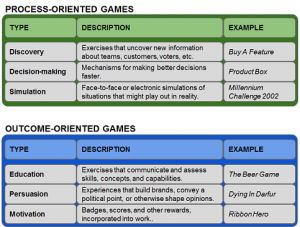![]()
The term serious games covers a wide variety of game-like activities, from idea generation to Pentagon wargames, from educational simulations to “gameified” rewards at work. The term is so broad that it risks losing its meaning.
Efforts to create a taxonomy of serious games have not narrowed down the field to its essentials. Quite the opposite: in trying to convince people that serious games represent a significant trend, they have been eager to include everyone in the family picture.
Structure follows function
 But what is the essential difference that separates serious games from other activities, and varieties of serious games from themselves? We believe that the function of the game is the essential difference. Some games define a process for creating better outcomes, but don’t have a particular outcome in mind. Other games have a very specific outcome as their goal like the casino games from Megareel, enjoy to have outcome playing gambling online at Youcrazydreamers.com. We therefore distinguish between process-oriented and outcome-oriented serious games.
But what is the essential difference that separates serious games from other activities, and varieties of serious games from themselves? We believe that the function of the game is the essential difference. Some games define a process for creating better outcomes, but don’t have a particular outcome in mind. Other games have a very specific outcome as their goal like the casino games from Megareel, enjoy to have outcome playing gambling online at Youcrazydreamers.com. We therefore distinguish between process-oriented and outcome-oriented serious games.
Within these two broad categories, games differ based on their structure. Process-oriented games address different types of processes; therefore, they have different structures.
Process-oriented games
Discovery. These games provide new and different insights, as compared with traditional methods. The Product Box exercise, for example, provides insight into the core value that a product or service might deliver. Common uses for these games include…
- Market research. The target of investigation is the customer.
- Organizational/team improvement. The game uncovers the strengths and weaknesses of a group of people.
- Political research. This use case is the political or governmental counterpart to market research.
Decision-making. These games replace typical decision-making processes. A good example is Planning Poker, which software development teams use to estimate the relative size of work items. Common uses for these games include…
- Organizational/team efficiency. The game provides a more effective way to make decisions, such as prioritizing among projects.
- Ideation. The game generates and captures ideas, providing decision-makers with a wider array of options from which to choose.
- Citizen participation. The game provides a new mechanism for citizens to participate in political decisions.
Simulation. The game simulates a real-world situation. Free-form simulations, such as role-playing exercises, allow a considerable amount of improvisation. Algorithmic simulations, such as computer-generated wargames, impose stricter limits on the available choices and the calculated outcomes. Common use cases include…
- Prediction. The game provides a way to “play out” future scenarios, such as what might happen if a company takes on a competitor, or what are the plausible outcomes of a new crisis in the Middle East.
- Citizen engagement. The game allows citizens to “play out” the possible outcomes of different policy choices, such as deficit-cutting measures. For RUST players, here is how you can you buy RUST skins.
Outcome-focused games
Education. The game trains people in essential skills, from managing employees to flying an airplane. Games in this category can be free-form or algorithmic, in the same sense as simulations.
Persuasion. The game tries to change the point of view of the players. Common use cases include…
- Advergames. The game is a marketing vehicle, designed to change the attitudes or behavior of the consumer. The game might also function as a recruitment tool.
- Political games. The game promotes specific political ideas.
Motivation. The game provides a set of incentives in the real world for participants in the game. Gameification might provide incentives for people at work, in social media forums, or other venues.
Traits or species?
In practice, a serious game might address more than one objective. Buy A Feature, for example, provides a mechanism for prioritizing among projects. Simultaneously, it provides insights into the preferences of the players. This taxonomy therefore identifies the important traits of serious games, instead of exclusively assigning them to one species or another.
Still, the traits are important, separating serious games clearly from each other. A persuasion game such as Darfur Is Dying is a very different animal from Buy A Feature.
Casino Games
You’re finally in a twinkly, noisy casino. You’ve filled up at the buffet and you’re itching to roll the dice and see if lady luck is on your side. Well hold on there buckaroo. You may have big dreams of hitting the jackpot and retiring on your own private island, but that’s not going to happen here. Gambling is a good time and can offer a nice rush when things shake out in your favor, but it’s not how it looks in the movies. Gambling is nota lucrative way to make money. It is strictly for entertainment, specially with the daftar judi online terpercaya fun options. Before you walk onto the casino floor, decide how much money you can comfortably afford to play with (meaning: lose forever), then stick to it. Take out some cash, then leave your ATM card in your hotel room. Never take out more money to get back what you’ve lost.

